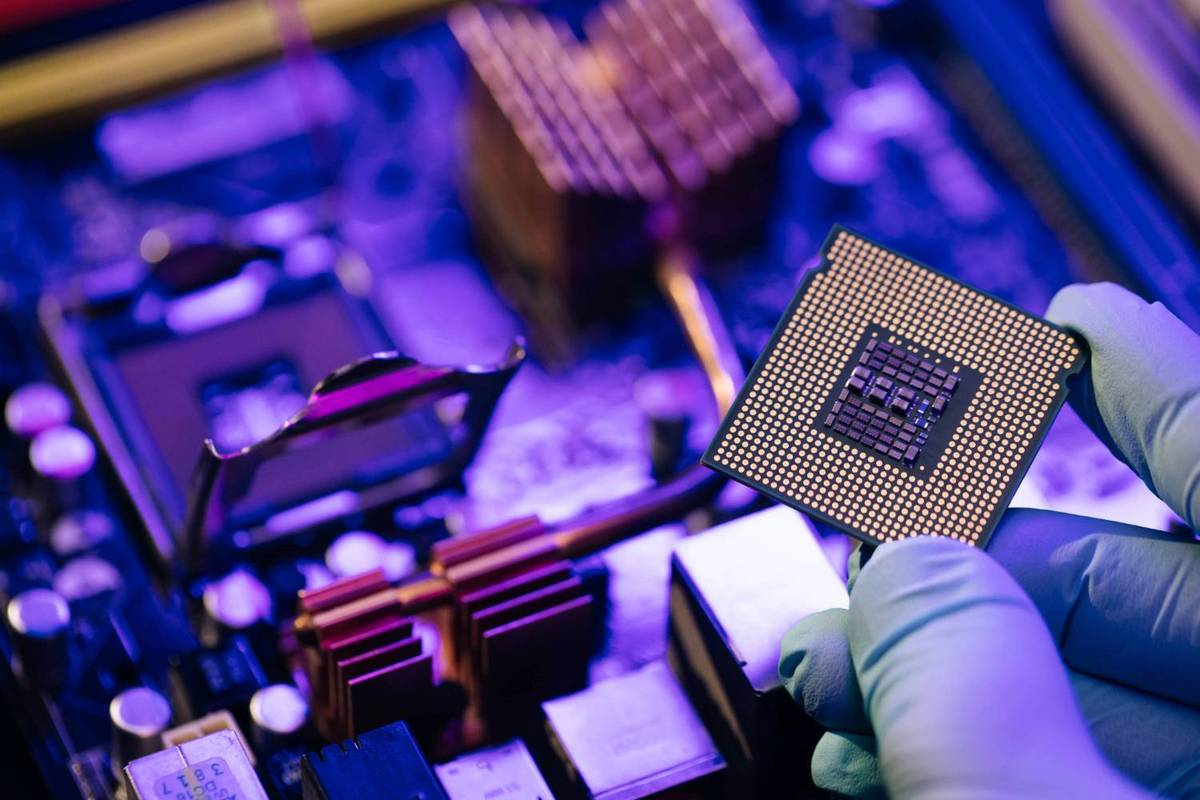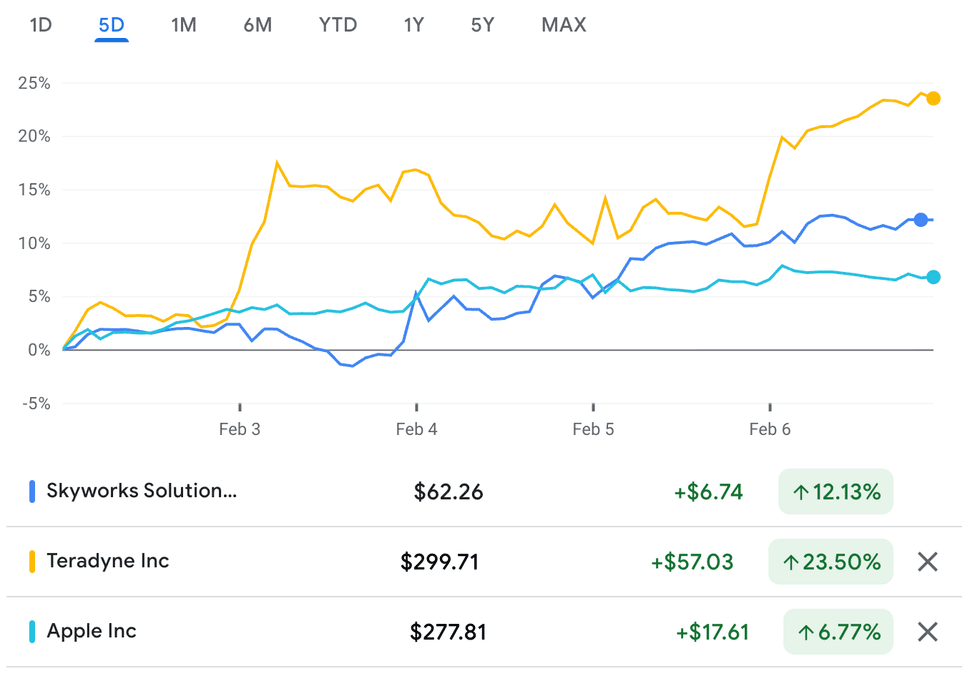Tech Weekly: Chip Stocks Pop to Close Volatile Trading Week
Explore this week’s top tech news and market movers, plus key catalysts to watch next week.

Welcome to the Investing News Network's weekly brief on tech news and tech stocks driving the market.
We also break down next week's catalysts to watch to help you prepare for the week ahead.
In this article:
This week's tech sector performance
Tech stocks extended their selloff into their second week, with the Nasdaq Composite (INDEXNASDAQ:.IXIC) posting its steepest two‑day decline since last April.
Monday (February 2) saw an early rotation out of tech ahead of Palantir Technologies (NASDAQ:PLTR) earnings report. NVIDIA (NASDAQ:NVDA) slipped on news that its proposed OpenAI‑backed investment hit a snag, dragging AI‑chip names like Advanced Micro Devices (NASDAQ:AMD), Broadcom (NASDAQ:AVGO) and other semiconductor leaders.
Palantir’s earnings, which beat expectations and included an aggressive revenue growth guide, lifted shares in an early surge on Tuesday (February 3); however, Nvidia’s OpenAI‑investment‑snag news, plus general AI‑disruption worries and positioning, weighed on the broader tech stack, sparking a tech‑growth selloff that impacted NVIDIA, Microsoft (NASDAQ:MSFT) and other software‑heavy names.
The Nasdaq fell deeper on Wednesday (February 4) as influential tech names such as AMD and other chip and software stocks reversed post‑earnings gains. AMD saw a sharp intraday plunge following its after‑hours earnings print on Tuesday. Its losses dragged the broader index lower.
Tech selloffs extended into Thursday (February 5), with the Nasdaq closing down 1.6 percent as major tech stocks saw profit‑taking and forward‑looking capex‑related concerns, later crystallized by Alphabet (NASDAQ:GOOGL) and Amazon (NASDAQ:AMZN) aggressive 2026 spending plans.
The Nasdaq made an impressive recovery on Friday (February 6) as a rally in chip stocks helped pare earlier week losses, despite ongoing volatility in the mega‑caps.
3 tech stocks moving markets this week
1.Teradyne (NASDAQ:TER)
After reporting Q4 2025 earnings results and strong AI-driven guidance on Monday, the stock rose sharply. The semiconductor‑test and robotics‑automation company makes equipment used to test chips, including AI‑related compute and memory and industrial robots.
2. Skyworks (NASDAQ:SWKS)
The analog and RF‑semiconductor company, which designs and manufactures components used in smartphones, 5G infrastructure, automotive and IoT devices, reported Q1 fiscal 2026 results on Tuesday, beating expectations and guiding up, which helped it outperform the broader tech selloff.
3. Apple (NASDAQ:AAPL)
Apple’s strong performance this week was driven by a wave of analyst upgrades and bullish notes that reinforced the positive narrative from last week’s record‑breaking Q1 print, especially around iPhone demand and China‑market strength.
Top tech news of the week
- Oracle (NYSE:ORCL) said it's raising US$45 billion to $50 billion in gross cash proceeds during 2026 to fund additional capacity for its largest Oracle Cloud Infrastructure customers' contracted demand.
- Canada led an AI delegation to the 2026 World Governments Summit (WGS) in Dubai this week, led by SCALE AI.
- Bloom Energy (NYSE: BE)reported Q4 2025 results after the market closed on Thursday, beating both earnings and revenue expectations. The stock rose sharply in after‑hours trading on very bullish 2026 guidance tied to AI data center demand; the company has secured major deals with Oracle, American Electric Power Company, Brookfield Asset Management (TSX:BAM,NYSE:BAM).
- Alphabet Q4 numbers were driven by search revenue growth, which accelerated by nearly 17 percent, and Google Cloud revenue that jumped 48 percent YoY, helping ease fears that AI chatbots would eat into search. Despite the strong print, the stock dipped as the company said it plans to increase capital expenditures to between US$175 billion and US$185 billion, more than its 2025 cash generation.
- Palantir’s earnings triggered a pop on Tuesday as it beat revenue expectations and laid out an aggressive 2026 growth guide. The company reported Q4 2025 revenue of US$1.41 billion, up 70 percentYoY, with US commercial revenue surging 137 percent and government revenue rising 66 percent, while guiding full‑year 2026 revenue to about US$7.2 billion
- Amazon also posted a solid quarter, but said it will spend roughly US$200 billion this year on capital expenditures, a 56 percent jump from 2025, to fund AI‑related infrastructure, data centers and custom chips for AWS. Revenue rose approximately 14 percent to US$213.4 billion, driven by AWS reaccelerating to 24 percent growth and advertising increasing by 22 percent, despite free cash flow collapsing due to a capex surge.
- Qualcomm (NASDAQ:QCOM) reported a mixed quarter, with AI-enabled mobile and automotive chip demand supporting revenue near expectations, but earnings missed. The company maintained focus on next-gen Snapdragon, automotive, and IoT expansion. However, the stock declined post-report due to general tech growth concerns.
Tech ETF performance
Tech exchange-traded funds (ETFs) track baskets of major tech stocks, meaning their performance helps investors gauge the overall performance of the niches they cover.
This week, the iShares Semiconductor ETF (NASDAQ:SOXX) advanced by 1.89 percent, while the Invesco PHLX Semiconductor ETF (NASDAQ:SOXQ) advanced by 1.66 percent.
The VanEck Semiconductor ETF (NASDAQ:SMH) also increased by 0.75 percent.
Tech news to watch next week
Next week is another earnings‑heavy, tech‑adjacent stretch, with a mix of big‑name reports and key macro data that will like keep markets sensitive to AI capex and earnings.
Coinbase (NASDAQ:COIN) and Robinhood Markets (NASDAQ:HOOD) will be among the most‑watched names tied to crypto and retail trading. Cisco (NASDAQ:CSCO) also reports midweek.
In addition to US wholesale inventories, Employment Cost Index and CPI reports, the FOMC minutes will be released on February 11, so rate policy and inflation will stay front‑of‑mind.
Don't forget to follow us @INN_Technology for real-time news updates!
Securities Disclosure: I, Meagen Seatter, hold no direct investment interest in any company mentioned in this article.

